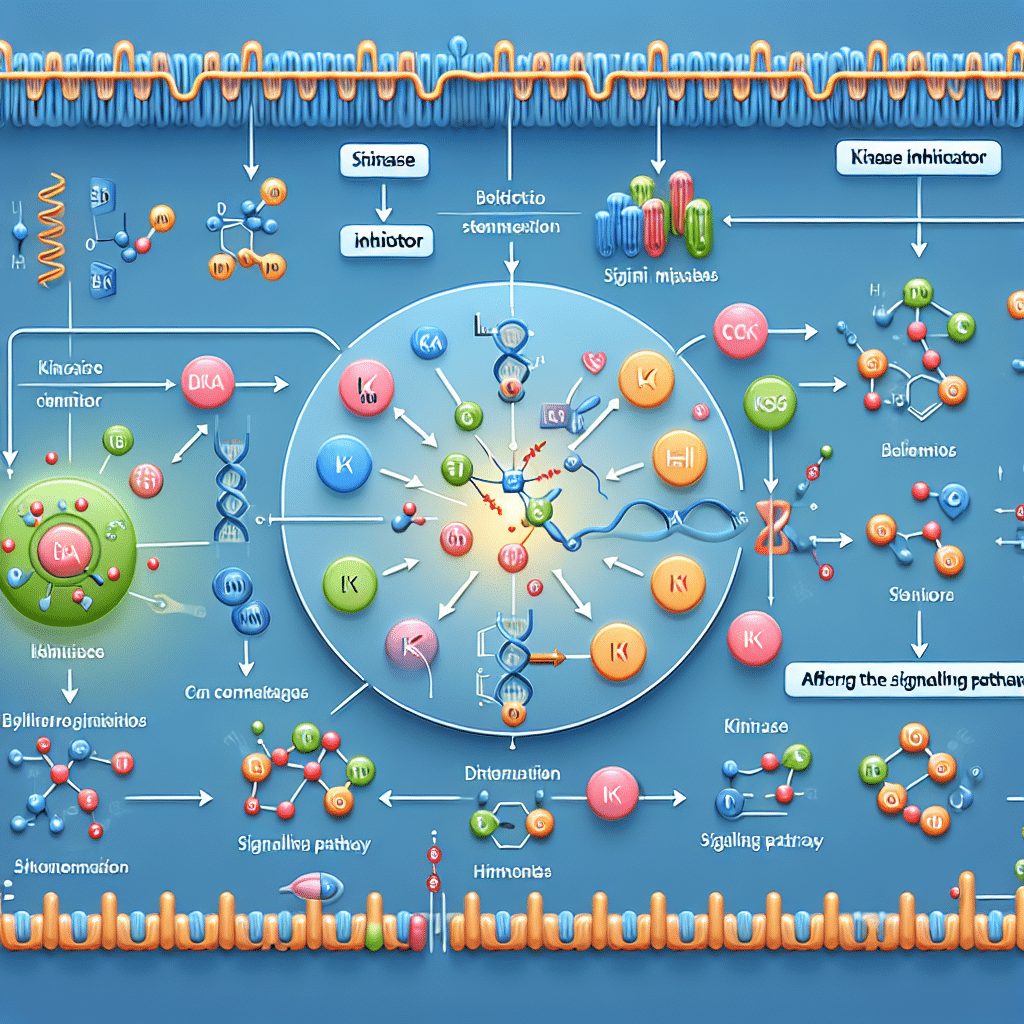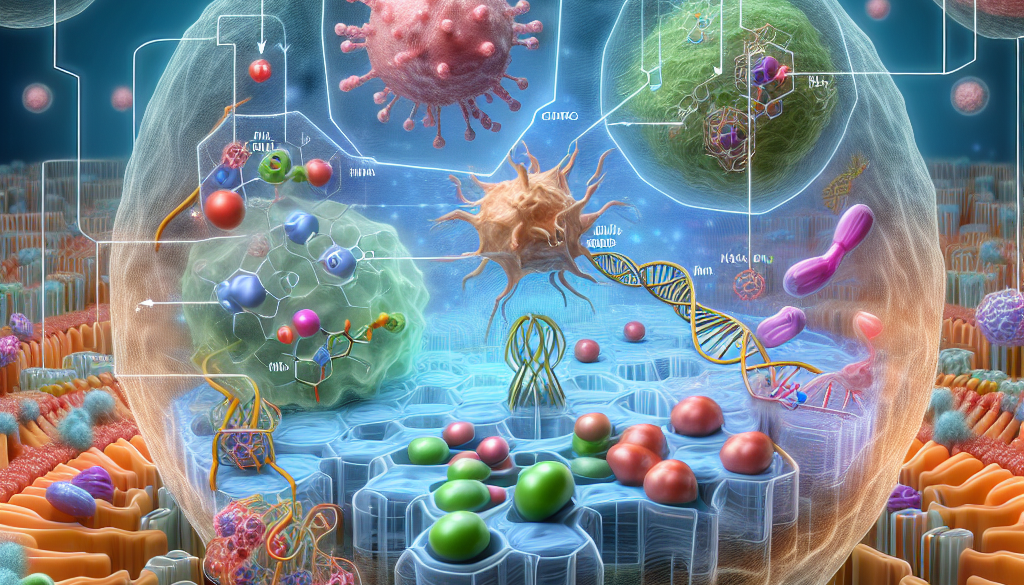Kinase Inhibitors: Targeting Signaling Pathways for Therapy
-
Table of Contents
- Kinase Inhibitors: Pioneering Therapies by Targeting Cellular Signaling
- Understanding Kinase Function and Dysregulation
- The Rise of Kinase Inhibitors in Targeted Therapy
- Challenges and Limitations of Kinase Inhibitor Therapy
- Case Studies and Clinical Successes
- Future Directions and Research
- Conclusion: Kinase Inhibitors as a Cornerstone of Modern Therapy
- Discover High-Quality Proteins with ETprotein
Kinase Inhibitors: Pioneering Therapies by Targeting Cellular Signaling

Kinase inhibitors have emerged as a revolutionary class of drugs that have transformed the treatment landscape for various diseases, particularly cancer. By specifically targeting signaling pathways that are dysregulated in diseases, these inhibitors can effectively halt the progression of illness with potentially fewer side effects than traditional chemotherapy. This article delves into the science behind kinase inhibitors, their therapeutic applications, and the impact they have on modern medicine.
Understanding Kinase Function and Dysregulation
Protein kinases are enzymes that play a pivotal role in the regulation of cellular processes by adding phosphate groups to proteins—a process known as phosphorylation. This modification can activate or deactivate proteins, thereby controlling various signaling pathways that dictate cell growth, division, metabolism, and apoptosis (programmed cell death).
However, when kinases become dysregulated, often due to genetic mutations, they can lead to uncontrolled cell proliferation and survival, contributing to the development of diseases such as cancer. Inhibiting these aberrant kinases offers a targeted approach to therapy, aiming to restore normal cellular function.
The Rise of Kinase Inhibitors in Targeted Therapy
Kinase inhibitors are small molecules that can interfere with the activity of one or more protein kinases. They are designed to bind to the ATP-binding site of the kinase, preventing the transfer of a phosphate group to the substrate protein. This specificity is what makes kinase inhibitors particularly attractive as therapeutic agents—they can potentially target disease-causing kinases while sparing normal cellular processes.
- Imatinib (Gleevec): A breakthrough in the treatment of chronic myeloid leukemia (CML), imatinib targets the BCR-ABL fusion protein, a constitutively active kinase resulting from a chromosomal translocation.
- Lapatinib (Tykerb): Used in breast cancer therapy, lapatinib inhibits the HER2/neu and epidermal growth factor receptor (EGFR) kinases, which are overexpressed in certain breast cancer subtypes.
- Sorafenib (Nexavar): This multi-kinase inhibitor is used in the treatment of advanced renal cell carcinoma and hepatocellular carcinoma, targeting several kinases involved in tumor growth and angiogenesis.
The success of these drugs has spurred the development of numerous other kinase inhibitors, with many more currently in clinical trials.
Challenges and Limitations of Kinase Inhibitor Therapy
Despite their success, kinase inhibitors face several challenges. One of the primary issues is the development of resistance. Tumors can adapt to the presence of the inhibitor, often through secondary mutations in the target kinase, rendering the drug ineffective. Additionally, the specificity of kinase inhibitors can be a double-edged sword; while it reduces side effects, it also means that tumors with different mutations may not respond to the treatment.
Another limitation is the potential for off-target effects. Although designed to be specific, kinase inhibitors can sometimes inhibit other kinases, leading to unintended side effects. This necessitates a careful balance between efficacy and toxicity when developing and prescribing these drugs.
Case Studies and Clinical Successes
The impact of kinase inhibitors is best illustrated through case studies and clinical successes:
- Chronic Myeloid Leukemia (CML): The introduction of imatinib has significantly improved the prognosis for CML patients, with long-term survival rates increasing dramatically since its approval.
- Non-Small Cell Lung Cancer (NSCLC): Kinase inhibitors targeting the EGFR have been successful in treating NSCLC patients with specific EGFR mutations, offering improved outcomes over traditional chemotherapy.
- Melanoma: Inhibitors of the BRAF kinase have shown remarkable efficacy in melanoma patients with BRAF V600E mutations, leading to the approval of vemurafenib and dabrafenib.
These examples underscore the potential of kinase inhibitors to provide personalized treatment options based on the genetic profile of the disease.
Future Directions and Research
Research into kinase inhibitors continues at a rapid pace, with efforts focused on overcoming resistance, improving specificity, and discovering new therapeutic targets. Combination therapies, where kinase inhibitors are used alongside other treatments such as immunotherapy, are also being explored to enhance efficacy and prevent resistance.
Advancements in technology, such as high-throughput screening and computational modeling, are aiding in the discovery and optimization of new kinase inhibitors. Moreover, the growing understanding of the human genome and tumor biology is paving the way for the development of next-generation inhibitors that can target a broader range of diseases.
Conclusion: Kinase Inhibitors as a Cornerstone of Modern Therapy
Kinase inhibitors represent a significant advancement in the field of targeted therapy. By honing in on specific signaling pathways, these drugs offer a more precise and often more effective treatment option compared to traditional therapies. While challenges such as drug resistance and side effects remain, ongoing research and clinical trials continue to expand the therapeutic potential of kinase inhibitors.
The key takeaways from this exploration into kinase inhibitors include their specificity in targeting dysregulated signaling pathways, their transformative impact on the treatment of diseases like cancer, and the ongoing efforts to overcome limitations and improve patient outcomes.
Discover High-Quality Proteins with ETprotein
For researchers and pharmaceutical companies looking to explore the potential of kinase inhibitors, high-quality proteins are essential for drug development and testing. ETprotein offers a wide range of protein products that can support these endeavors.
ETprotein’s offerings include various organic bulk vegan proteins and plant proteins, such as organic rice protein, clear rice protein, pea protein, clear pea protein, and more. These products are characterized by their neutral taste, non-GMO, and allergen-free attributes, making them suitable for a diverse range of applications in the nutraceutical, pharmaceutical, and food and beverage industries.
With a reputation for excellence and a client base that includes leading global brands and Fortune 500 companies, ETprotein is a trusted partner in the global market. For more information or to sample their products, please contact them at sales(at)ETprotein.com today.
About ETprotein:
ETprotein, a reputable protein Chinese factory manufacturer and supplier, is renowned for producing, stocking, exporting, and delivering the highest quality organic bulk vegan protein and plant proteins. They include Organic rice protein, clear rice protein, pea protein, clear pea protein, pumpkin seed protein, sunflower seed protein, mung bean protein, peanut protein etc. Their offerings, characterized by a neutral taste, non-GMO, allergen-free attributes, cater to a diverse range of industries. They serve nutraceutical, pharmaceutical, cosmeceutical, veterinary, as well as food and beverage finished product distributors, traders, and manufacturers across Europe, USA, Canada, Australia, Thailand, Japan, Korea, Brazil, and Chile, among others.
ETprotein specialization includes exporting and delivering tailor-made protein powder and finished nutritional supplements. Their extensive product range covers sectors like Food and Beverage, Sports Nutrition, Weight Management, Dietary Supplements, Health and Wellness Products, and Infant Formula, ensuring comprehensive solutions to meet all your protein needs.
As a trusted company by leading global food and beverage brands and Fortune 500 companies, ETprotein reinforces China’s reputation in the global arena. For more information or to sample their products, please contact them and email sales(at)ETprotein.com today.














